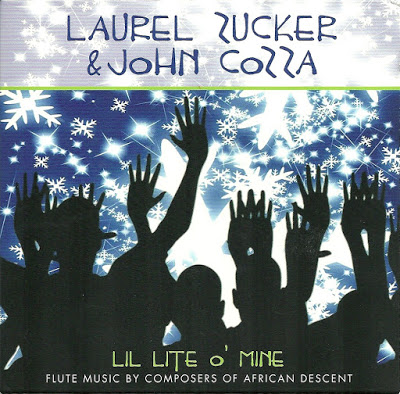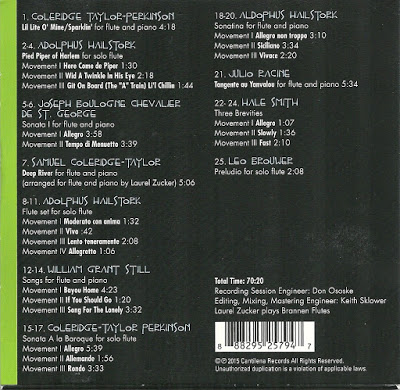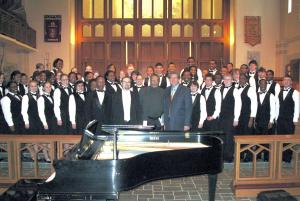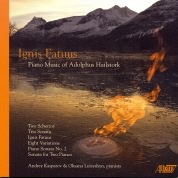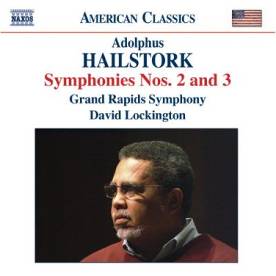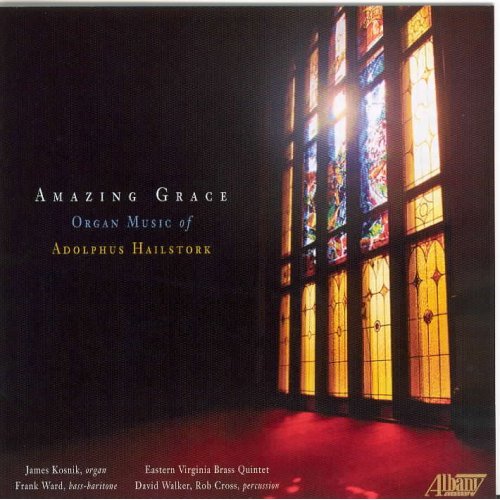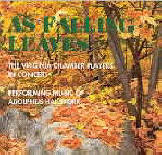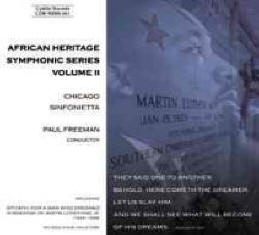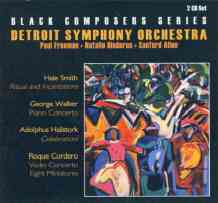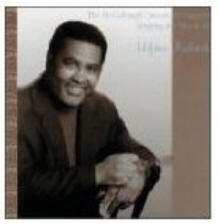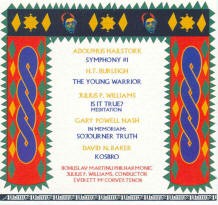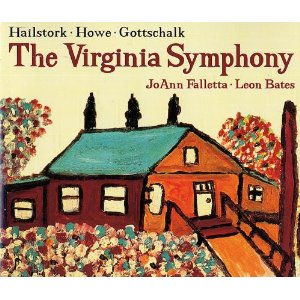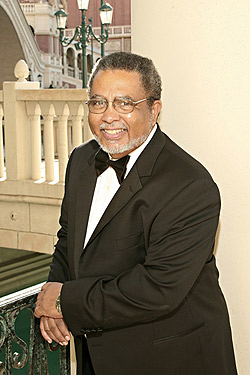Home ->
Composers -> Hailstork, Adolphus
Cunningham
Français
Audio
Samples:
1 Cedille 90000 061; African Heritage
Symphonic Series,
Vol. II; Chicago Sinfonietta; Paul Freeman, Conductor
a An American Port Of
Call
b
Epitaph
for a Man who Dreamed - In
Memoriam: Dr. Martin
Luther_King, Jr.
(1929-1968)
2
Albany Records Troy 104 (1993); Symphonic Brotherhood: The Music of African-American Composers; Bohuslav Martinu Philharmonic; Julius Williams, conductor
Symphony No. 1
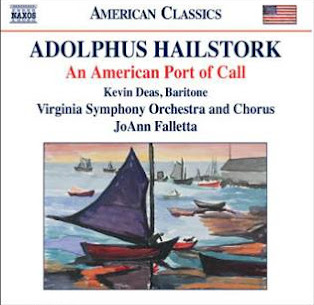
An American Port of Call,
Naxos 8.559722 (2012)
1
Birth
Adolphus C. Hailstork is an
African American composer and professor who was born on April
17, 1941. He was interviewed by William J. Zick on April 13,
2010. A
transcript
can be read on AfriClassical Blog, and is excerpted on this
page. Prof. Dominique-René de Lerma of Lawrence University
Conservatory writes in the liner notes of
African Heritage Symphonic
Series, Vol. II;
Cedille CDR 90000 061 (2001):
|
Adolphus Cunningham
Hailstork was born in Rochester, New York in 1941, but
spent most of his childhood in Albany, where he joined
the choir of the Episcopalian cathedral. From this
experience he developed an interest in vocal melodic
writing that asserts itself not only in his choral works
and art songs. |
2 Youth
Adolphus Hailstork attended the
public schools of Albany, New York. He says in his interview:
|
Early on, I took a
Music Aptitude Exam given by the school system in New
York State where I grew up.”
“Apparently they
thought I had some aptitude for music. If you do, you
wind up getting free instrumental lessons. I started out
on the violin by the Fourth Grade, and then switched to
Piano and Organ, sang in the Choirs, and that was all my
early schooling. |
3 Improvising
Prof. Hailstork says he
improvised for hours on the piano, and decided he should study
Composition:
|
I liked the piano because I could sit and improvise for
hours, and that's when I decided I preferred to
improvise rather than to practice my scales and
arpeggios. That's when I decided “Hey, maybe I better go
on to Composition!” I love making up stuff!
|
4 Sketchbook
The website of Old Dominion's University says of Hailstork:
|
While
attending Albany High School he began to conduct a boys'
choral group and to compose music. |
|
Asked if he had composed before
he entered Howard University, Prof. Hailstork replied:
|
Yes. I have a notebook here from '57 that has some early
sketches for pieces in it. That's the earliest extant
stuff I have!
...
Mostly they were little piano pieces....The high school orchestra director, a wonderful woman
named Gertrude Howarth, said “If you write it, we'll play
it!”...Started in high
school and have never stopped!
...That makes this the 53rd
year I've been at this stuff; I'm finally getting it! |
5 Howard University
Prof. Dominique-René de Lerma
writes in the liner notes:
|
Directing his
attention to composition, Hailstork entered Howard
University in 1959, where he studied with Mark Fax and
Warner Lawson. |
6 The Race for Space
He was 18 when he wrote
Theory2a
for an
assignment, according to
“Kaleidoscope:
The Musical World of Adolphus Hailstork.”
It also
says he wrote the music for
The
Race for Space.
|
(Laughs) Yes! A little musical! That was the second
musical I did at Howard; I wrote two in a row.
|
7 Kampus Kapers
The
composer recalled that the other musical he wrote at Howard was
Kampus Kapers.
He
continued:
|
The current President of Wayne
State University helped write the script!...His name is Irvin Reid. |
8 Manhattan School of Music
Dr. Hailstork
subsequently attended the Manhattan School of Music, where he
studied with Ludmila Uleha, Nicholas Flagello, Vittorio Giannini
and David Diamond, according to
The Harvard Biographical
Dictionary of Music.
“Kaleidoscope” observes that he
composed Concert
Invention
in his first semester, completing the piece on December 19,
1963. Dr. Hailstork completed
Phaedra
on February 15, 1965.
He received a Bachelor of Music degree in Composition in 1965
and a Master of Music degree in Composition in 1966.
Statement, Variations and Fugue
was his master's thesis and was performed by the Baltimore
Symphony in 1966, according to the Presser website.
9
U.S. Armed Forces
Dr. Hailstork served in
the U.S. Armed Forces in Germany from 1966-68. The interviewer
asked what his musical activities were while he was in the
military.
|
I
just wrote! I rented a piano, put it in the bachelor
officers quarters, in my room, and wrote music!...I entered as a First
Lieutenant because I had gotten time served in grade as
a Second Lieutenant while I was working on my Master's.
I left as a Captain. My time there was delightful! I was
given the very pleasurable job of running the Officers
Club! |
10 Michigan State University
Upon his return to
the U.S. In 1968, Adolphus Hailstork attended Michigan State
University. The website of his publisher, Theodore Presser Co.,
indicates Dr. Hailstork began his teaching career as a graduate
teaching assistant from 1969-1971 at M.S.U., where he obtained a
Ph.D. in 1971.
11 Celebration!
Adolphus
Hailstork began as a Professor of Music at Youngstown State
University in 1971. While there he composed Celebration!
in 1974.
Prof. Dominique-René de Lerma
writes:
|
Hailstork's first
faculty appointment was at Youngstown State University
in Ohio. During this time, he attended the 1975 Black
Music Symposium in Minneapolis, where Paul Freeman was
conducting a series of events, including a reading
session devoted to new works. One of these was
Hailstork's
Celebration!,
a
work commissioned by the J.C. Penney Foundation in
anticipation of the American Bicentennial. It proved to
be exceptional in all respects. |
12 Epitaph
Dr. Hailstork became a
Professor at Norfolk State University in 1977, the year he won a
national competition for his work Out of the Depths
for band, according to the
Theodore Presser Co. Two years later, he wrote his compositional
tribute to Dr. Martin Luther King, Jr., Epitaph For A
Man Who Dreamed, In Memoriam: Dr. Martin Luther King, Jr.
(1929-1968). Prof.
Dominique-René de Lerma writes of the tribute:
|
Hailstork's 1979
Epitaph, by
contrast, comes after a decade of reflection. Showing
his distinctive mastery of orchestration and harmony, it
is a work of transcendent beauty that conveys the
nobility of its subject, and serves as a tribute of
acceptance. |
13 An American Guernica
The Hal
Leonard Corp. says of Adolphus Hailstork's 1983 composition
American Guernica:
|
Composed in
memory of four little girls killed by a bomb explosion
at the 16th Street Baptist Church, Birmingham, Alabama,
during Sunday school class 15 September 1963. |
A
member of the forum MusicByJason.com wrote on Jan. 27, 2008:
|
It's a piece
written for wind ensemble that was written in about
1983. I just played it with the Georgia All-College Band
this past weekend in Savannah, and all I have to say
about the piece is "Wow."...I've heard it said you don't listen to "American Guernica",
you experience it, and after playing it, I'm inclined to
agree. |
The Theodore Presser website says this piece won a national
competition.
14 Done Made My Vow
The “Kaleidoscope” exhibit
says Done Made My
Vow
was
completed in 1985:
|
Of this work, Dr.
Hailstork has commented: "In this composition I have
coupled Euro-American structural methods (Melodic
counterpoint, extensive key changes, long range
graduation, dramatic contrasts) with Afro-American
idioms and processes (spirituals, chant-song, ostinato,
rhythms, polymeters). |
Phyllis Fleming, then
Education Coordinator for the
Detroit Symphony Orchestra, sat next to the composer during the
D.S.O. premiere with the Brazeal Dennard Chorale. She says:
|
It was a unique
experience to watch the work come alive through his
response. |
15 An American Port of Call
Prof. De Lerma writes that
An American Port of Call
(1985) (8:32) was “commissioned
by the Virginia Symphony.” He continues:
|
The work is in a
ternary form: the initial presentation of melodic ideas
is followed by a section that plays with their
implications and a conclusion that serves as a reminder
of the original materials. |
An American Port of Call is
the title work on the Virginia Symphony Orchestra recording,
Naxos 8.559722 (2012). In the Composer's Notes for that
recording, Hailstork explains:
|
The
great port of Norfolk, Virginia, where I live, was the
direct inspiration. |
16 Symphony No. 1
Adolphus Hailstork's
Symphony No. 1
(23:10) was composed in 1988
and is found on the CD
Symphonic Brotherhood,
Troy 104 (1993). The Bohuslav Martinu Philharmonic was conducted
by Julius P. Williams. The liner notes tell us:
|
Hailstork's
Symphony No. 1
was written for a summer music festival in Ocean Grove,
New Jersey, where the composer conducted the first
performance. |
A slightly shorter performance
(21:10) has been recorded by the Virginia Symphony Orchestra,
led by JoAnn Falletta, conductor, on Naxos 8.559722 (2012).
17 Consort Piece
The
Theodore Presser website tells of the 1995 composition
Consort Piece:
|
Consort Piece
(1995), commissioned by the Norfolk Chamber Ensemble,
was awarded first prize by the University of Delaware
Festival of Contemporary Music. |
18 Slave Song
The
“Kaleidoscope” exhibit explains the origin of
Slave Song:
|
This song,
written in 1996, sets a text by Frederick Douglass. It
was premiered with Adolphus Hailstork and Doug Chenault
at the Unitarian Church of Norfolk, Va. Slave Song was
written for and dedicated to Willis Patterson, Associate
Dean, School of Music, University of Michigan. |
19 Symphonies Nos. 2 & 3
The
composer's
Symphonies Nos. 2 & 3
are paired
on Naxos 8.559295, whose liner notes relate that Hailstork began
composing his
Symphony No. 2
in 1995
before
Leslie Dunner, Resident Conductor, asked the Detroit Symphony
Orchestra to commission the work, which it premiered in February
1999. The composer began writing the symphony without a program
in mind:
|
In the
summer of 1996, I took a trip to Africa. There I visited
the forts along the coast of Ghana, and saw the dungeons
where the slaves were held before being shipped
overseas. I put my reaction to that sad scene in
movement two of this symphony. In movement four I sought
to reflect the determination of a people who had arrived
in America as slaves, but struggled, with courage and
faith, against numerous odds.
...
The goal in my Third Symphony was to write a piece that
was lighter in approach than my second. |
20 Common Ground
Paul Laurence Dunbar: Common
Ground
was
written for the Dayton Opera Company by Adolphus Hailstork.
DunbarSite.org elaborates:
|
The opera's composer is
Adolphus Hailstork, professor of composition at Norfolk
State University. "When I discovered Dunbar's work, I
realized that he was my artistic ancestor, because I
write music that reflects a double cultural experience,
that of my standard European-oriented education and that
of my ethnic heritage." Hailstork blended the two
influences in the opera, using standard harmonic and
melodic styles for some pieces while choosing a musical
style reflective of African-American blues and gospel in
others. |
21 Joshua's Boots
Joshua's Boots
is an opera commissioned by the Opera Theatre of St. Louis,
Prof. De Lerma writes. It premiered in 1999. The program notes
at SusanKander.net tell us:
|
Set in 1878,
Joshua's Boots is based on extensive research
into the real "wild west," specifically the recently
"re-discovered" historical importance of Black Cowboys
and the all-black Buffalo Soldiers in the opening up of
the country. The opera is a real Western, complete with
saloon singers and dancers, cowpokes and cowboy songs
and life on the long, lonely and dangerous cattle drive. |
22 As Falling Leaves
The
composer reveals his thoughts about
As Falling Leaves, on a 2004 Albany CD,
in the “Kaleidoscope” exhibit:
|
They did not
commit suicide; they were already dead – and they knew
it.
...
That was my first thought when I heard about the
people who, when trapped on the upper floors of the
World Trade Center on September the eleventh, two
thousand and one, chose to leap to their death rather
than to be incinerated in the two thousand degree
inferno surrounding them.
It was a final
life choice. In this composition, actually a tone poem
for flute, viola and harp, I wanted to reflect the
thoughts of a person facing that gruesome choice.
...
The
leap into space is the final dance. |
23
Forms & Styles
The Presser site gives an overview of the compositional forms
and styles employed by Hailstork:
|
Hailstork writes in a
variety of forms and styles: duos for such combinations
as horn and piano, clarinet and piano, flute and piano,
and other symphonic works and tone poems for orchestra;
a piano concerto; numerous chamber works; a large number
of songs including songs for soprano, baritone,
mezzo-soprano, some with piano and others with orchestra
or chamber group; band works and band transcriptions,
and many pieces for piano. |
|
24 Courses
In 2000, Prof. Hailstork
assumed his present position at Old Dominion University, where
he is an Eminent Scholar as well. In the interview he was asked
what courses he teaches.
|
One year I teach
Orchestration; the other year I teach
Counterpoint, and I have four Composition students. |
Prof. Hailstork said the
Composition students each have one individual lesson a week, and
his teaching schedule has been in place for 10 years.
25 Organ Resumed
The composer was asked if he
favored the organ.
|
Yes! About ten years
ago, I started taking organ lessons again with a
colleague on Old Dominion's staff, and really realized
that was the instrument I should have stayed with and
that is more natural to me than the piano is, because of
the sustained sounds and the kind of rich textures that
you can get on the organ. |
26 Amazing
Grace
The interviewer asked if Prof.
Hailstork resumed organ lessons before recording his organ CD
Amazing Grace.
|
Yes, I did. In fact, the organist on
Amazing Grace
was the teacher I was studying with! |
The
composer identified the organist as James Kosnik. He was asked
if his return to the organ had been fruitful for him.
|
Oh, yes it was! It was fruitful and satisfying! |
27 Three
Spirituals
Three Spirituals
(2005) (8:17) consists of No. 1 Everytime I Feel
The Spirit; No. 2 Kum Ba Yah; and No. 3 Oh
Freedom. JoAnn Falletta conducted the Virginia
Symphony in a performance on Naxos 8.559722 (2012).
Hailstork writes in the Composer's Notes:
|
I made
the arrangements in 2005 to help celebrate the reopening
of the Crispus Attucks Theater in Norfolk, Virginia. |
28
Whitman's Journey
Whitman's Journey: 1. Launch
Out on Endless Seas (2005) (17:37) is a choral work sung by
Kevin Deas, baritone, and the Virginia Symphony Chorus, whose
Director is Robert Shoup. The Composer's Notes tell us:
|
Whitman's Journey, Launch Out on Endless Seas was
commissioned by Donald J. McCullough for the Master
Chorale of Washington, DC. The première took place in
April 2006 at the Kennedy Center for the Performing
Arts.
...
The texts used in this piece are among the early,
youthful poems in Whitman’s Leaves of Grass. They depict
Whitman’s vigorous optimism and his call to all women
and men to join with him as he launches out on life’s
great journey. |
29 AGO Workshop
On
March 2, 2010 Cincinnati.com posted an article by Teresa Cleary
on a performance of Adolphus Hailstork's Wake Up, My Spirit
at Cincinnati's Christ
Church Cathedral:
|
The Winton Woods High School Varsity Ensemble had the
extraordinary opportunity to perform for noted composer
Adolphus Hailstork at a workshop presented by the
Cincinnati Chapter of the American Guild of Organists on
Saturday, February 20. Dr. Hailstork is the leading,
living African-American composer of classical music. |
30 Choral
Commissions
The
interviewer asked if Dr.
Hailstork had
concentrated more on choral works in recent years
|
I've been commissioned for choral and orchestra a lot
over the past 10 years! It's still going on....A
lot of colleagues of my age are instrumentally oriented,
and I came up as a singer. So I was very vocally
oriented, and song and lyricism and tonality are all
important to me. |
31
Composing Philosophy
The
composer was invited to comment on his philosophy of composing.
|
I can only talk about the characteristics that I have
observed in my own work. It's always lyrical, tonal,
narrative, dramatic, and propulsive. I just wanted to
add to the repertoire. I didn't switch over to the
school of thought that came into being in the Sixties of
reinventing music. Because a lot of it just didn't sing
for me. |
32 Music
Education
Prof. Hailstork was asked: "Do you have any thoughts on the
crisis facing Music in public education?"
|
It's a shame that so many Music programs have been cut
out of public education. I'm glad that it was available
for me when I came along, because that's where I really
got my start! I went in the public school system,
singing in the public school choirs and playing in the
public school orchestras. That's where it all began for
me, along with my excellent exposure in an Episcopal
Cathedral. Those two things had a big impact! This is
one person whose whole life started with public school
Music! |
33 Recordings
Adolphus
Hailstork: An American Port of Call;
Naxos 8.559722 (2012), was recorded live. The Virginia
Symphony was led by JoAnn Falletta and was joined by the
Virginia Symphony Chorus and baritone, Kevin Deas for
performances of five works by Hailstork: his Symphony No. 1,
Three Spirituals, An American Port of Call,
Fanfare on Amazing Grace and Whitman’s Journey, Part
One: Launch Out on Endless Seas.
Adolphus
Hailstork: Ignis Fatuus; Andrey Kasparov, piano; Oksana
Lutsyshyn, piano; Invencia Piano Duo; Albany 1112 (2009).
Scherzos (2) for Piano; Trio Sonata; Ignis Fatuus;
Variations (8) Shalom Chaverim; Sonata for Piano No.
2; Sonata for 2 Pianos.
Legacy: Works for Bassoon by African-American Composers;
Bassoon Set;
Lecolion Washington, bassoon; Mark Ensley, piano;
Troy 1038 (2008).
Great European Organs Vol 72: Gaston Gilbert Litaize, Herbert
Sumsion, Henk Temmingh, Wijnand Van Klaveren, August Gottfried
Ritter, Anthon van der Horst, Alec Rowley, Adolphus Hailstork,
Samuel Rousseau;
Prelude and Toccata for Organ
on "Veni Emmanuel": Toccata;
Herman
Jordaan, organ;
Priory
Records 863 (2008).
2007 Midwest
Clinic; New Wade'n Water; Austin Symphonic Band;
Mark Records 7322 (2008).
Adolphus Hailstork: Symphonies Nos. 2 and 3;
American Classics, Naxos 8.559295 (2007). David Lockington
conducts the Grand Rapids Symphony. Symphony No. 3,
I. Vivace (12:00); II. Moderato (12:04); III. Scherzo
(04:45); IV. Finale: Moderato (11:55). Symphony No. 2,
I. Allegro (8:00); II. Grave (10:59); III.
Allegro con brio (04:43); IV. Adagio - Allegro (13:05).
Copland And His American Contemporaries;
The Song of Deborah;
Oxford New College Choir;
Edward Higginbottom, conductor;
Avie 2086
(2007). John Quinn writes in MusicWeb International: “The anthem
by Hailstork is written in a fluent and accessible style. I
found it to be most impressive and it’s clear that this composer
is very comfortable writing for unaccompanied voices.”
Amazing Grace: Organ Music of Adolphus Hailstork;
Fanfare on Amazing Grace;
Everytime I Feel The Spirit; There is a Balm In Gilead; Wade in
the Water; Go Down Moses; Oh Freedom;
Eastern
Virginia Brass quintet; Rob Cross, timpani; James Kosnik, organ;
Frank Ward, bass-baritone; Troy 873 (2006).
Lil' Lite O' Mine;
The Pied Piper of
Harlem; Harold
Jones, flute; Collette Valentine, piano; Leonarda 355 (2005).
As Falling
Leaves: Music by Adolphus Hailstork;
Debra
Cross, flute; Beverly Baker, viola; Barbara Chapman, harp;
Charles Woodward, piano; Robert Cross, percussion; Vahn
Armstrong, violin; Amanda Gates-Armstrong, violin; Jennifer
Snyder, viola; Michael Daniels, cello; Troy 612 (2004). 1.
Sanctum
2.
Arabesques
3.
String Quartet No. 1
4.
Two Romances for Viola &
Chamber Ensemble.
What A Mighty God: Spirituals and Gospels for Chorus;
Crucifixion;
VocalEssence Ensemble; Philip Brunelle, conductor; Clarion 904
(2004). David Vernier writes in ClassicsToday.com:
"Original
works include Adolphus Hailstork's dynamic and emotionally
powerful
Crucifixion...”
Dance Like The Wind: Music of Today's Black Composers;
Nocturne;
Maria Jette, soprano; VocalEssence Ensemble; Philip Brunelle,
conductor; Clarion 906 (2004).
Rodney Mack: Spirit of the Trumpeter;
Variations for Trumpet;
Rodney Mack, trumpet; Karen
Walwyn, piano;
Troy 552 (2003).
Celebration! (3:16), Black Composers Series, Sony Music Custom
Marketing Group DSO-1111 (2002). Paul Freeman conducted the
Detroit Symphony Orchestra in a 1976 recording of Celebration! as part of the historic
CBS Black Composers Series. The
recording has been reissued on CD by Sony.
The liner
notes are by Professor Dominique-René de Lerma: “Celebration!,
commissioned by J.C. Penney in anticipation of the American
Bicentennial, was premiered by Paul Freeman and the Minnesota
Orchestra at the 1975 Black Music Symposium in Minneapolis. The
composer wrote at the time: 'Celebration!
Is tonal, straightforward, energetic, and positive – all of the
things I consider necessary to project the spirit of a festive
occasion.'"
Epitaph for a Man who Dreamed - In Memoriam: Dr.
Martin Luther King, Jr. (7:37) and An American Port of Call (8:32); African
Heritage
Symphonic Series, Vol. II; Cedille 90000 061 (2002). Both works
were recorded by the Chicago Sinfonietta under the direction of
Paul Freeman, Conductor.
Paul Freeman Introduces... Hailstork, Gemrot and Felciano;
Sonata da Chiesa;
Czech
National Symphony Orchestra; Paul Freeman, conductor; Troy 499
(2002). Albany Records says: “Adolphus Hailstork composed his
Sonata da Chiesa
(church sonata) on commission from the Thomas Jefferson High
School for Science and Technology in Alexandria, Virginia for
its string orchestra. It was premiered there in 1992. The Sonata
da Chiesa reflects the composer's fascination with cathedrals,
particularly the Cathedral of All Saints in Albany, N.Y. where
he was a chorister as a child.”
Orff – Carmina Burana: Works By Schubert, Rheinberger, Billings,
Byrd, Schumann, Mozart, Hailstork, Hogan and Erb;
Choirs of The
College of William & Mary; James Armstrong, Jr., Director
(2001). This double CD featured selections from concerts and
performances of 1996-1998.
Lo, There Is Light!; Song
of Deborah
for
soprano, alto, chorus and organ;
Nancy B.
Granert, organ; Murray Forbes Somerville, conductor; Pro Organo
(2001).
Dark Fires Vol. 2: Ellis Marsalis, David Nathaniel Baker, Alvin
Singleton, Adolphus Hailstork, Coleridge-Taylor Perkinson;
Sonata for Trumpet and Piano;
Karen
Walwyn, piano; Rodney Mack, trumpet; Troy 384 (2000). A review
in Fanfare
says: “… Karen Walwyn and her friends present a fine clutch of
pieces that touch on a variety of cultural influences with
confidence and adroitness. Excellent recorded sound and robust
performances…”
I Will Lift Up
Mine Eyes: A Celebration Of The Music Of Adolphus Hailstork;
Baltimore Symphony
Orchestra; Daniel Hege, conductor; Morgan State University
Choir; Baltimore Symphony HAIL-001 (2000). 1. Intrada
(1:46) 2. Done Made My Vow
(45:16); Janice Chandler, soprano; Gregory Hopkins, tenor;
Darrien Cofield, boy soprano; Dr. Harold A. Carter, Sr., speaker
3. An American Fanfare
(3:55) 4. I Will Lift Up Mine Eyes
(3:26); Thomas Young, tenor;
Dr. Nathan Carter, conductor 5. How Long?
(10:13) 6. The Lord is My Shepherd
(5:56).
Sence You Went Away: Contemporary African American Art Songs &
Spirituals; Slave Song;
Alvy Powell,
bass-baritone; Byron Burford, piano;
Troy 387
(2000).
Pacific Chorale; Nocturne;
The Cloths of Heaven;
John Alexander, conductor (2000). Amazon.com explains: “The
Cloths of Heaven
sets with rich, romantic music a contemplative poem by William
Butler Yeats.”
Dark Fires: 20th Century Music for Piano;
Piano Sonata No. 1;
Karen Walwyn, piano; Troy 266 (1997). Albany Records explains:
“The significance of this four-volume recording project is its
celebration of 20th century compositions for piano and some
Chamber works written by Americans of African descent that have
never been recorded or have had limited recorded performance.
The contributions of the American composer of African descent to
classical music is rarely addressed, and as a result, this music
remains virtually unknown."
The Virginia Symphony: Hailstork, Howe, Gottschalk;
1. Epitaph
(In Memoriam: Martin Luther King, Jr.); 2. Piano
Concerto: Moderato 3. Piano Concerto:
Adagio 4. Piano Concerto: Lento - Vivace 5.
Celebration!; JoAnn
Falletta, conductor; Leon Bates, piano;
Music & The Arts (1997).
The McCullough Chorale In Concert Singing the Music of Adolphus
Hailstork; 1.
Spiritual Songs
2.
Songs of Life and Love
3. Setting from the
Song of Solomon
4. The Lamb
5.
Seven Songs of the
Rubaiyat
6.
A Carol For All Children.
Donald
McCullough, conductor; Troy 156 (1995).
Epitaph: Music of Adolphus Hailstork, James "Kimo" Williams,
Roque Cordero; Epitaph; An
American Port of Call;
Chicago
Sinfonietta; Paul Freeman, conductor; Fanfare Records 3534
(1995).
Symphony No. 1 (23:10), Symphonic Brotherhood, Troy 104 (1993).
Julius P. Williams, Conductor, leads the Bohuslav Martinu
Philharmonic.
An American Port of Call: Music of Adolphus Hailstork;
1.
An American Port of Call
(8:21)
;
Rundfunk-Sinfonie Orchestra 2.
Epitaph
(7:30);
Ljubljani 3. Piano
Sonata No. 1
(28:00);
Raymond Jackson 4.
Piano Trio
(19:44);
Nova Trio;
Adolphus Hailstork (1993).
This page was last updated
on
March 5, 2022
